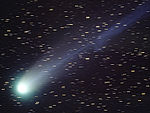84P/Giclas
Appearance
 | |
| Discovery | |
|---|---|
| Discovered by | Henry L. Giclas |
| Discovery date | September 8, 1978 |
| Designations | |
| 1931 R1; 1978 R2; 1978 XXII; 1978k; 1985 M1; 1985 XV; 1985g; 1992 XXV | |
| Orbital characteristics | |
| Epoch | March 6, 2006 |
| Aphelion | 5.443 AU |
| Perihelion | 1.852 AU |
| Semi-major axis | 3.647 AU |
| Eccentricity | 0.4923 |
| Orbital period | 6.965 a |
| Inclination | 7.2810° |
| Last perihelion | June 3, 2020[1] July 23, 2013[2] August 7, 2006 |
| Next perihelion | 2027-Feb-12[3] |
84P/Giclas is a periodic comet in the Solar System. The comet nucleus is estimated to be 1.8 kilometers in diameter.[4] In 1995 precovery images from three nights in September 1931 by Clyde W. Tombaugh were located.[5]
During the 2020 apparition it was not more than 60 degrees from the Sun until September 2020.
On 11 June 2033 the comet will pass 0.0387 AU (5,790,000 km; 3,600,000 mi) from the asteroid 4 Vesta.[6]
The nucleus of the comet has a radius of 0.90 ± 0.05 kilometers, assuming a geometric albedo of 0.04.[7]
References
[edit]- ^ "84P/Giclas Orbit". Minor Planet Center. Retrieved 2014-06-16.
- ^ Syuichi Nakano (2010-04-09). "84P/Giclas (NK 1911)". OAA Computing and Minor Planet Sections. Retrieved 2012-02-18.
- ^ "Horizons Batch for 84P/Giclas (90000868) on 2027-Feb-12" (Perihelion occurs when rdot flips from negative to positive). JPL Horizons. Retrieved 2022-06-19. (JPL#49 Soln.date: 2021-Mar-29)
- ^ "JPL Small-Body Database Browser: 84P/Giclas" (2021-03-18 last obs). Jet Propulsion Laboratory. Retrieved 2012-02-18.
- ^ Bouma, R. J. (1 May 1995). "Comet 84P/Giclas". International Astronomical Union Circular (6168): 4. ISSN 0081-0304.
- ^ "JPL Close-Approach Data: 84P/Giclas (Archived)" (2007-03-12 last obs). Archived from the original on 2012-12-13. Retrieved 2012-02-22.
{{cite web}}: CS1 maint: bot: original URL status unknown (link) - ^ Lamy, P. L.; Toth, I.; Weaver, H. A.; A'Hearn, M. F.; Jorda, L. (December 2009). "Properties of the nuclei and comae of 13 ecliptic comets from Hubble Space Telescope snapshot observations". Astronomy & Astrophysics. 508 (2): 1045–1056. Bibcode:2009A&A...508.1045L. doi:10.1051/0004-6361/200811462. S2CID 125249770.
External links
[edit]- 84P/Giclas – Seiichi Yoshida @ aerith.net
- 84P at Kronk's Cometography
- 84P/Giclas at the JPL Small-Body Database

